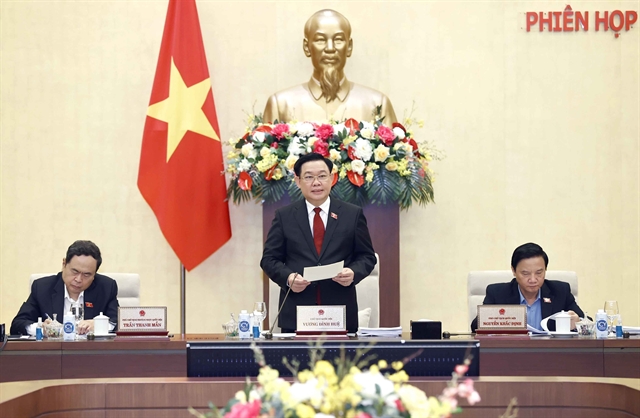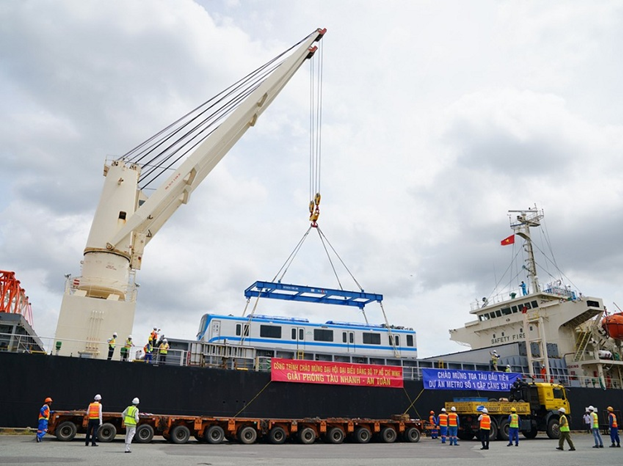 Politics & Law
Politics & Law


|
| National Assembly Chairman Vương Đình Huệ.delivers his speech at the opening ceremony of the National Assembly Standing Committee's 28th session on Wednesday morning in Hà Nội.—VNA/VNS Photo Doãn Tấn |
HÀ NỘI — All members of the National Assembly Standing Committee agreed on Wednesday morning to establish Việt Yên Town in the northern province of Bắc Giang and Hậu Hiền Town in Thiệu Hóa District in the northern province of Thanh Hóa.
Presenting the Government's Report at the 28th session of the National Assembly Standing Committee on Wednesday morning, Minister of Home Affairs Phạm Thị Thanh Trà said Bắc Giang Province proposed to establish Việt Yên Town on the basis of the current area and population size of Việt Yên District.
Under the establishment of the town, nine wards would be set up based on the current area and population size of two areas of Bích Động and Nếnh, and seven communes of Tăng Tiến, Hồng Thái, Quảng Minh, Ninh Sơn, Vân Trung, Quang Châu and Tự Lạn.
Trà said that Việt Yên district was located at the southwest gateway of Bắc Giang province with vital traffic routes passing through. It was believed to be convenient for socio-economic development. Under the plans approved by competent authorities, the district was planned to become a town in 2021-30.
Additionally, Bắc Giang Province and Việt Yên District had prepared resources to invest in socio-economic development in the district while the district’s urban appearance was increasingly being upgraded.
As a result, the Ministry of Construction issued Decision No. 1286/QĐ-BXD on November 29, 2021, recognising the district meeting Class-IV urban standards.
In Việt Nam, urban areas are classified into six categories. The categories consist of special cities of Hà Nội and HCM City; and Class I (with a population over 1 million), Class II (population over 200,000), Class III (population over 100,000 city), Class IV (population over 50,000) and Class V (population over 4,000).
“Based on the location, advantages as well as socio-economic development and urbanisation of the district, the establishment of Việt Yên Town is necessary,” Trà said.
She also added that Thanh Hóa Province proposed to combine Thiệu Phú Commune and Thiệu Hóa Town to establish Hậu Hiền Town with the total population of over 21,000.
Thiệu Hóa Town is the centre of Thiệu Hóa District. The town is located between four dynamic economic regions of the province. Thiệu Hóa Town and Thiệu Phú Commune were assessed to meet Class-V urban standards by the provincial People's Committee.
Therefore, it was imperative to set up Hậu Hiền Town to meet the requirements of expanding urban space, economic management, construction management, architecture, population management, ensuring security and order in the locality, she said.
Speaking at the session, Chairman of the National Assembly's Committee on Legal Affairs Hoàng Thanh Tùng, who is the representative of the verification agency for the Government's Report, said that the committee applauded the need to establish the two towns.
Tùng said the two resolutions to establish the two towns, which were approved by the National Assembly Standing Committee, were proposed to take effect in February 2024 so that agencies, organisations and localities could promptly change their seals and other necessary conditions for the operation of the newly established administrative units.
NASC 28th session opening
The National Assembly Standing Committee started its 28th meeting in Hà Nội on Wednesday morning under the chair of National Assembly Chairman Vương Đình Huệ.
Speaking at the opening ceremony, Huệ said the meeting was scheduled to take place on December 13, 14 and 18. During the session, the committee would consider 19 major issues.
The committee would draw lessons from the National Assembly’s sixth session and discuss preparations for the National Assembly's upcoming session in May 2024.
The committee would consider and approve its 2024 working programme, foreign affairs and international cooperation programme, and give opinions on the foreign affairs and international cooperation programme of National Assembly's committees, the Council for Ethnic Affairs, the National Assembly Secretary General, friendship parliamentarians’ groups and the National Assembly’s Office.
Next, the committee would also offer feedback on the draft Ordinance on Litigation Costs, consider adding draft laws into the 2024 law and ordinance building programme, and approve its draft resolution on guiding the explanatory activities during meetings of the National Assembly Ethnic Council and National Assembly’s committees.
Apart from mulling over a dozen of important issues related to finance-budget, administrative boundary and personnel, the committee would also hear a report on the National Assembly’s ombudsman activities for October and November, and decide on its draft resolution on the allocation of funding for the activities of National Assembly delegations for the next year. — VNS




